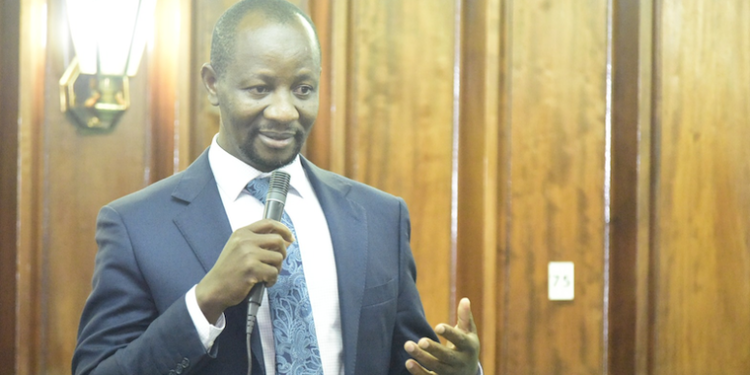By THE OBSERVER UG
Ibrahim Ssemujju Nganda, the Member of Parliament representing Kira Municipality and former Forum for Democratic Change-FDC party whip in parliament, recently expressed his surprise regarding his predecessor, Yusuf Nsibambi, signing his (Ssemujju’s) minority report on the budget.
Ssemujju revealed that Nsibambi, in his role as the designate whip for FDC MPs on parliamentary committees, had initially withdrawn his membership from the Budget Committee, which is responsible for scrutinizing the national budget. However, Nsibambi later resumed his membership when he was appointed as the shadow minister of Finance in the National Unity Platform-led government of the opposition.
Consequently, his appointment automatically made him a member of the committee tasked with handling matters related to the ministry of Finance.
It’s worth noting that the FDC, once the largest opposition political party, is currently divided into two factions, with one faction led by Patrick Oboi Amuriat and the other by Erias Lukwago, the Kampala lord mayor.
Ssemujju’s tenure as the party whip in parliament came to an end when he took a stand against Nandala Mafabi, the party secretary general, and party president Amuriat for accepting funds from President Yoweri Museveni, which were used during the 2021 campaign.
In his interview, Ssemujju also provided insight into his rationale for writing a minority report, which was subsequently signed by all opposition members participating in the committee’s proceedings.
Excerpts
It was indeed surprising to witness Yusuf Nsibambi, the member of parliament for Mawokota South and the FDC whip, adding his signature to your minority report, especially considering his prior efforts to have you ousted from the Budget Committee. The question that arises is: what prompted his decision to endorse the report?
The public needs to understand that every member of parliament (MP) on that committee has the ability to write a minority report; there could potentially be as many as 20 different minority reports.
However, at times, MPs might not invest the necessary time in these processes due to the substantial reading required. It’s crucial not to present something that lacks substance, as it can reflect poorly on one’s credibility.
Moreover, when you have a knowledgeable individual who can prepare a minority report, the most efficient approach is to collaborate with that person. It’s worth noting that Yusuf Nsibambi did not initially include me on that committee. In fact, he continued to oppose my inclusion, even escalating the matter to the speaker’s level, as he believed that the Budget Committee held the utmost importance.
However, its significance truly lies in the dedication and time invested in it. I was genuinely surprised when he approached me and expressed his intention to sign the report. I am pleased that he did, as it demonstrates his continued affiliation with the opposition. In fact, this marked a rare occasion where almost every opposition member signed the report.
Ultimately, what truly matters in the committee is not just who sits on it but, rather, the valuable contributions that an MP brings to the table.
You have previously addressed some of the issues highlighted in your report. What leads you to believe that this time around, people will be more receptive and attentive to your concerns?
Our minority report addresses several crucial aspects, with the first one being the state of revenue in the country. Over the last four years, the Uganda Revenue Authority (URA) has consistently reported an increase in local revenue, even during the challenging times of the Covid-19 lockdowns. However, it’s concerning that now, when everything appears to be stabilizing, our local revenues are projected to grow by only Shs 286 billion.
The issue I wanted to highlight in parliament is the potential discrepancy in these figures. It’s questionable that taxes reportedly grew by Shs 2.1 trillion during the Covid-19 pandemic, yet now they are expected to increase by only Shs 286 billion. This raises concerns about passing a budget based on inaccurate data.
The law stipulates that the government must provide a budget ceiling that cannot be altered once approved. However, one way to manipulate this ceiling is by initially presenting minimal revenue figures and later claiming to have identified an additional Shs 2 trillion for allocation. Therefore, my plea to parliament was not to accept this approach, as it could result in funds being introduced at the last minute, without the necessary oversight for allocation.
Several government officials assert that the national debt is manageable, but your report appears to raise doubts regarding this assertion. Additionally, you are questioning the accuracy of the figures presented by various government institutions.
We are planning to finance this budget primarily through borrowing. Only 56% of the budget will be covered by the taxes collected within Uganda, while the remainder will be acquired through loans. However, there is a discrepancy in the total debt figures presented by the ministry of Finance.
They report it as Shs 86 trillion, while the Auditor General’s figure stands at Shs 97 trillion. This disparity indicates that the debt-to-GDP ratio has exceeded the supposed sustainable threshold of 50%.
Furthermore, the ministry of Finance fails to include domestic arrears, which are amounts owed to individuals and entities that have supplied goods and services to the government. These arrears amount to Shs 5.7 trillion, contrasting with the ministry’s claim of Shs 2.7 trillion. In light of these inconsistencies, our message to parliament is to exercise caution and not rush to approve these processes, as there are concerns of misinformation.
The credibility of the information provided to us is also questionable. The Bank of Uganda, the ministry of Finance, and the Auditor General all present conflicting data. This divergence raises the crucial question of whom to trust.
Why are there discrepancies in government figures?
In the upcoming financial year, debt repayment will amount to Shs 7 trillion, surpassing the allocation for investment in agriculture. We are now allocating more resources to servicing interest payments than to critical social services. This begs the question: what will experience faster growth under these circumstances? One does not need to be an economist to recognize the troubling path that our country is headed towards.
You also raise concerns about how the allocated funds are utilized. Some argue that you are excessively focused on President Museveni in this regard.
The limited funds that we are able to collect are largely financing the extravagance and wastefulness within our government, with President Museveni’s office and residence being at the forefront.
To illustrate, the ministry of Health reports a total of 178 ambulances in government facilities, whereas President Museveni’s residence boasts 266 vehicles. His convoy consists of 70 cars, and State House employs a staff of 1,000 individuals. In stark contrast, critical facilities like the ICU at Mulago hospital are unable to function at full capacity due to staffing shortages.
Our main point of contention lies in the utilization of the limited resources we collect. The question arises: how are these funds being allocated? It’s unrealistic to expect the economy to flourish as if it were nourished by rainwater when such disparities exist. Although some of this information may be outdated, it remains pertinent every time we engage in the budget processing phase.
Do you think MPs can adopt your minority?
You wouldn’t believe how many people approached me after my presentation. I don’t want to embarrass them because their interactions weren’t captured on film, but a significant number of MPs, if you were to ask them privately, would express strong support for my report, with nearly 95 per cent in agreement.
Some of the more outspoken ones have acknowledged the report’s significance, noting that this information is often concealed from them or dispersed across various government reports. My role was simply to consolidate this data and present it to them as a coherent picture of the situation.
It’s important to emphasize that neither the ministry of Finance nor our main Budget committee has been addressing these issues adequately. Whether they choose to utilize this information is ultimately their decision. In the previous year’s minority report, we highlighted the problem of President Museveni allocating Shs 37 billion to [Odrek] Rwabwogo for value addition in the coffee chain.
At the time, they accused us of attacking the Museveni family, even though Rwabwogo’s name wasn’t in the report, and they even attempted to prevent me from presenting it. Now, they find themselves in the public eye, debating the same issue on television, radio, and social media.
For us, the issues we raise are grounded in reality, and if they disregard the information, they may find themselves addressing these very same concerns in the following year. Personally, I feel that I’ve fulfilled my responsibilities and can now consider taking a well-deserved holiday.







Discussion about this post